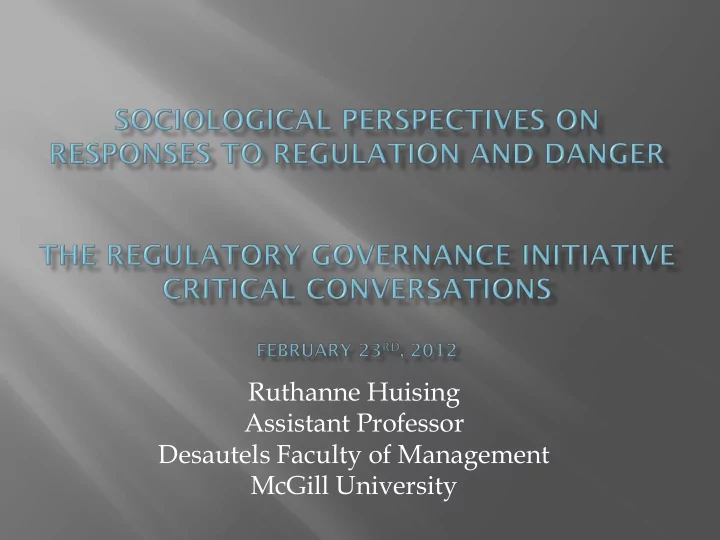

Ruthanne Huising Assistant Professor Desautels Faculty of Management McGill University
Ethnographic study of responses to regulation and danger. The researcher: Is embedded in the organization, community, or group for several months or years Records observations, interviews, and, in some cases, participating Produces rich description of response but also analytic understanding of patterns
A gap, a space, a lacuna between… Rules Response in situ Regulations Practice Procedures Enactment The gap will always exist and persist. Focus of governance rather than closure. How do we manage this gap?
Human cognition differs because it is influenced by cultural and social processes Understand that centrality of meaning in action and cognition We act based on our interpretations Interpretations are constructed through experience, occupation, norms, persuasion Interpretations are constructed in dyads and groups as we narrate our experiences
BIOLOGISTS - CHEMISTS - RESISTANCE WILLINGNESS* Why? Historic relationship of the discipline to industrial practice Social organization of the laboratory Experimental practices , materials, and equipment Susan S. Silbey, Governing Green Laboratories: Trust and Surveillance in the Cultures of Science
Frameworks for interpreting and responding to cues are disrupted Shift from decision making to sense making Shift to emergent efforts to create order and make sense of what is happening Informs alternative responses and strategies A group process in which distributed cognition is leveraged to find answers It occurs through conversation, fast, fact-based, emergent, open. Depends on the strength of the groups role structure
Support Sense Making through Role Structures Membership, tasks, roles, and expertise are specified Roles are clear and continuous The interlocks between roles are clear and continuous Individual specialization is known and leveraged Strong Role Structure avoids Paradox of Obedience Breakdown of authority at crucial moments observed in both Mann Gulch and Storm King Fires Lightens cognitive load of any one individual
Deteriorating sense making efforts can be stabilized by enforcement of role structure or vice versa
Bricoleurs – experienced individuals improvise using materials at hand Virtual Role System – assume what ever role is vacant, pick up the activities, and run a credible version of the role Protocol Breaking – wisdom to deviate from protocols under conditions of uncertainty Relational Regulation – identification and leverage of relational dependencies in the organization Responsibilization - devolving control to all members of the organization.
Incentives New Technologies Command and Control Structures Perfecting Policies Better Communication Another gap emerges… initiating another cycle of emergent governance
Ethnographic Observation Behavioral Modeling/ Interviews System Dynamics Field experiments With the purpose of capturing: 1. Situated perceptions and experiences 2. Processes of governing gaps 3. Observe role of key “variables”
Ruthanne Huising ruthanne.huising@mcgill.ca
Recommend
More recommend